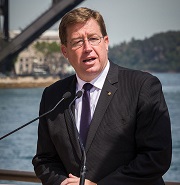Griffith woman shares story in bid to help legalise medical cannabis
Regarding the following article by http://www.dailyadvertiser.com.au/story/3694871/why-medical-cannabis-has-to-be-legal/
Kelly is right on the ball when she "blamed big pharmaceutical companies for lobbying governments and obstructing the passage to legalisation."
In 2014 the top 10 pharmaceutical companies made approximately 86 billion dollars profit between them.
If medical cannabis was available at a reasonable price, like in Uruguay where it's $1 per gram, or if patients were allowed to grow it themselves, pharmaceutical companies would really feel the sting in their pockets.
That's the price cannabis should be, or there abouts. It's a fast growing, pest resistant herb that will grow in most climates and as such should be affordable for patients.
In the government's and pharmaceutical companies eagerness to profit from this organic non-toxic natural medicine, they've forgotton about the people who need this medicine to function a normal life, or do they care? Is it just about money and the economy? has society become so twisted?
A great example of leading a normal life on cannabis is Irvin Rosenfeld, a Florida resident who suffered from a rare bone disease and has consumed over 120,000 cannabis joints over the past 34 years. All supplied by the U.S. government on a monthly basis.
Irvin drives to work every day after consuming 3 joints (no tobacco ever) and has never had an accident whilst driving. Irvin did mention he got pulled over for going 10 mph over the speed limit once, but has had no other issues whilst driving.
Irvin's 63 and presently works as a stockbroker, has done so for the past 29 years. Initially doctors predicted Irvin wouldn't survive past his teens, but depite that prognosis he lives a normal life with his partner Heidi, all thanks to cannabis.
The US Government has supplied Irvin with an aluminium canister of 300 pre-rolled joints every month for the past 34 years, though this is a fact that they do not like to advertise. The cannabis is grown on the university of Mississippi campus.
Despite his diagnosis he's proven to be a productive member of society.
As for Kelly and the related article below; I applaud you Kelly for having the fortitude to speak out, it takes real courage and your words resonate through the masses who know what's right and maybe also those who seem to not care, but should.
What we don't need in Australia is an oligopoly put together by big pharmaceutical companies and the Australian government as though it's for the public's safety.
The town of Nimbin in northern NSW has been freely growing, providing and using cannabis since the early 70's (for the most part) without government interference.
Don't they care about the residents of Nimbin and their health or is this a 50 year social experiment that's outside the law? Double standards?
A RIVERINA woman who turned to cannabis to deal with crippling arthritis has joined the crusade to legalise the drug as medicine.
Kelly Cameron, 33, said despite medical cannabis giving her profound relief from her chronic condition, she was too concerned to take it during the week because of fear of prosecution.

Meanwhile, the NSW government has approved clinical trials of the drug.
Ms Cameron, a former top-flight equestrian rider, first experimented with medical cannabis after her body was unable to cope with opiates.
“Opiates made me violently ill and I turned to it as a last resort,” Ms Cameron said.
“I was at my wit’s end; I had nowhere else to turn.
“If I can’t have it, I can’t live a normal life.”
The Griffith vet nurse said tougher drug-driving laws, which are set to intensify in 2016, meant she was unable to use it during the working week.
She said it was “ludicrous” that she the only place she could buy such an effective medicine was on the black market.
“We need complete and utter law reform, it’s that simple,” Ms Cameron said.
“The government is putting lives at risk (by not legalising it).”
She also blamed big pharmaceutical companies for lobbying governments and obstructing the passage to legalisation.
Ms Cameron even raised the spectre of medical cannabis creating a new industry in the Riverina.
“I’d like to see the industry brought back here and given to farmers,” she said.
Wagga MP Daryl Maguire pledged his support for Ms Cameron’s stance and medical cannabis.
“If it’s going to provide relief for terminally ill patients or children suffering convulsive events, then we should legalise it,” he said.
“I was one of the first MPs to support it.
“It has had enormous support from members of parliament. We have a responsibility and we’re acting very quickly on it.”
Polls have consistently shown more than two-thirds of Australians back the use of medical cannabis.
reference: http://www.dailyadvertiser.com.au/story/3694871/why-medical-cannabis-has-to-be-legal/
How Pharmaceutical Companies Torpedo Cannabis Legalization
Cannabis can make diseases more bearable. Sometimes, it can even fight them successfully. There are people who claim that cannabis is the best pain relief that they have ever tried, better than, for example, Ibuprofen, and better than paracetamol because it has no side effects. And the best part about it: everybody could easily grow cannabis in the garden. For free.
Mexico opens landmark debate on marijuana laws
A big question on my mind is does Australia want to promote criminal activity through the prohibition of cannabis, which has been widely scientifically proven to be a safe herb, both for recreational and medicinal use or will it maintain it's archaic naive attitude and focus it's attention on profiting through taxes on this non toxic harmless medicine?
Presently it looks like the latter, but unless the cost is driven down there will always be criminal activity involved.
Mexico, seems to be looking at a new solution after a very bloody and long war on drugs.
Mexico is proof that the war on drugs can't be won and in the end scientific education is the only real fix.
"The prestige of government has undoubtedly been lowered considerably by the prohibition law. For nothing is more destructive of respect for the government and the law of the land than passing laws which cannot be enforced. It is an open secret that the dangerous increase of crime in this country is closely connected with this."
- Albert Einstein quote on (EDIT: alcohol prohibition)
The following article is from: Yahoo News
Mexico City (AFP) - Mexico opened on Tuesday a national debate on prohibitionist marijuana laws, as the government appeared open to legalizing medical cannabis use.
President Enrique Pena Nieto, who personally opposes legalization, decided to hold five public forums after the Supreme Court opened the door to recreational use of marijuana in a country beset by drug cartel violence for a decade.
"This is an issue that has directly or indirectly affected the lives of millions of Mexicans," Interior Minister Miguel Angel Osorio Chong said at the start of the first debate, which was broadcast online.
"Such a delicate issue cannot be left to improvisation," he said in the Caribbean resort city of Cancun, where experts were invited to debate the drug's effects on public health and addiction.
Legalization supporters argue that decriminalizing marijuana would strip drug cartels of a major source of revenue and reduce violence that has killed tens of thousands of people.
Pena Nieto has rejected such arguments, but he indicated that his government would be open to changing the laws, depending on the outcome of the debate.
Osorio Chong strongly hinted that the administration was open to the medical use of marijuana, noting that there is a "majority (of public) opinion" in favor of such uses.
The government, he said, "is completely open to measures that improve the quality of life" of its citizens.
Roberto Campa, a deputy interior minister for human rights, said that international conventions do not prohibit the medical use of marijuana.
"There is much more space to find agreements in this sense," Campa told reporters.
A senator from Pena Nieto's Institutional Revolutionary Party has introduced legislation that would authorize medical marijuana.
Opinion polls show that most Mexicans oppose the legalization of marijuana but that they back its medical use.
An eight-year-old epileptic girl named Grace became the symbol of efforts to legalize medical marijuana in Mexico when her parents won a court case last year that allowed them to import a cannabis-based oil to treat her.
Since then, other families with epileptic children have urged policymakers to loosen the laws.
- Growing regional debate -
The government will host four more debates in other parts of the country between January and April ahead of a United Nations conference on drug policy.
The Cancun debate included experts from Harvard University and the National Autonomous University of Mexico, with split opinions on the benefits of legalizing pot.
"Not all consumption is problematic. It depends a lot on the dose, the frequency (of drug use) and the age," said Deni Alvarez Icaza, a Mexican psychiatrist and co-author of the book "Marijuana and Health."
A Mexican health ministry study found that 17.2 percent of middle and high school children consume drugs, with most of those using marijuana.
The forums in Mexico are part of a growing debate in the region on legalizing marijuana.
In December, the president of Colombia, another country beset by drug violence, signed a decree legalizing medical marijuana.
Uruguay has created a regulated market for pot, while Chile's Congress is considering a bill to legalize the drug.
In the United States -- the biggest consumer of drugs from Mexico -- 23 states have legalized medical marijuana use while four states plus the US capital city have legalized its recreational use.
reference: https://au.news.yahoo.com/world/a/30663214/mexico-opens-landmark-debate-on-marijuana-laws/
Cannabis testing is ruining lives say protesters
Activists say they are undeterred that Lismore MP Thomas George was not present when they gathered outside his office this week to protest against the roadside drug-testing regime.
About 70 people gathered to voice their concerns against the tests, which detect cannabis and other drugs, but do not test for impairment.
Latest
Coronavirus Strikes Massachusetts Cannabis Company Employees
Reassessing the Essential: Cannabis in the Time of a Pandemic
5 Reasons To Try Aspen Valley CBG Flower (30% Off)
High Times Cannabis Cups Go Virtual In Wake Of Coronavirus Pandemic
Drug Enforcement Administration Proposes Plan To Expand Cannabis Research
Ghana Legalizes Cannabis For Medicinal And Industrial Uses
The cheapest legal weed in Canada: Discover these cannabis ‘value brands’
Cannabis and coronavirus: Here’s what you need to know
cannabis designs
The Best Of
WHO Rules CBD Should Not Be a Scheduled Drug

Dr Cristina Sanchez PhD video interview on medical marijuana and cancer

Biochemist Dennis Hill interview; Cannabis oil as a cure for cancer.

The unofficial World Record holder for cannabis smoking part 1









